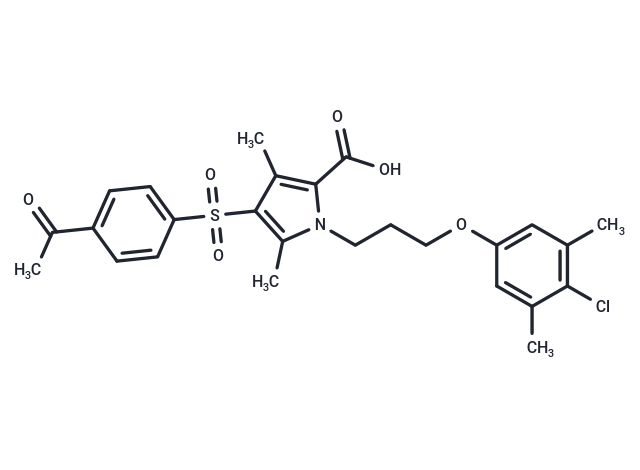Shopping Cart
- Remove All
 Your shopping cart is currently empty
Your shopping cart is currently empty

Mcl-1 inhibitor 6 is a potent, orally active chemical compound that selectively inhibits the myeloid cell leukemia 1 (Mcl-1) protein, with a high affinity (K d = 0.23 nM) and binding activity (K i = 0.02 μM). This compound exhibits exceptional selectivity over other members of the Bcl-2 family, including Bcl-2, Bcl2A1, Bcl-xL, and Bcl-w (K d >10 μM). Notably, Mcl-1 inhibitor 6 demonstrates strong antitumor activity.


| Description | Mcl-1 inhibitor 6 is a potent, orally active chemical compound that selectively inhibits the myeloid cell leukemia 1 (Mcl-1) protein, with a high affinity (K d = 0.23 nM) and binding activity (K i = 0.02 μM). This compound exhibits exceptional selectivity over other members of the Bcl-2 family, including Bcl-2, Bcl2A1, Bcl-xL, and Bcl-w (K d >10 μM). Notably, Mcl-1 inhibitor 6 demonstrates strong antitumor activity. |
| Targets&IC50 | BCL-W:>10 μM (Kd), BCL2:>10 μM (Kd), BCL2:10 μM (Ki), BCL-XL:>10 μM (Kd), BCL2A1:>10 μM (Kd), MCL1:0.02 μM (Ki), MCL1:0.23 nM (Kd), Bfl-1:1.57 μM (Ki) |
| In vitro | Mcl-1 inhibitor 6 exhibits inhibitory activity with K_i values of 10 μM and 1.57 μM against Bcl-2 and Bfl-1, respectively[1]. At concentrations of 1 and 5 μM over 48 hours, it significantly induces apoptosis in a dose-dependent manner[1]. Additionally, treatment with Mcl-1 inhibitor 6 at concentrations ranging from 0.1 to 5 μM for 4 hours significantly enhances PARP cleavage in H929 cells, also in a concentration-dependent fashion[1]. Over 72 hours, this inhibitor demonstrates antiproliferative effects on various tumor cell lines, including H929, MV4-11, SK-BR-3, and NCI-H23, with IC_50 values between 0.36 and 3.02 μM, while showing high selectivity against the CML cell line K562 (IC_50 >30 μM)[1]. In detailed analysis, apoptosis is notably induced in H929 cells treated with 1 and 5 μM for 48 hours, and PARP cleavage is markedly upregulated in these cells when exposed to concentrations from 0.1 to 5 μM for 4 hours, evidencing the concentration-dependent effectiveness of Mcl-1 inhibitor 6[1]. |
| In vivo | Mcl-1 inhibitor 6, administered at 60 mg/kg orally (PO) or 20 mg/kg intraperitoneally (IP) every two days for two weeks, demonstrated significant in vivo tumor growth inhibition in Balb/c nude female mice aged 7 weeks with MV4-11 xenografts, achieving tumor/control percentages (T/C) of 37.30% (PO) and 5.52% (IP), respectively[1]. Additionally, pharmacokinetic analysis in SD rats (200-250 g) revealed that at dosages of 3 mg/kg intravenously (IV) or 10 mg/kg orally (PO), the compound had a half-life (T 1/2) of approximately 2.3 hours and a clearance (CL) rate of 15.18 mL/min/kg when administered intravenously. Oral administration results showed a T 1/2 of 2.1 hours, a CL of 36.8 mL/min/kg, and a maximum concentration (C max) of 2012.95 ng/mL[1]. |
| Molecular Weight | 518.02 |
| Formula | C26H28ClNO6S |
| Cas No. | 2598978-56-2 |
| Storage | Powder: -20°C for 3 years | In solvent: -80°C for 1 year | Shipping with blue ice. |

Copyright © 2015-2025 TargetMol Chemicals Inc. All Rights Reserved.